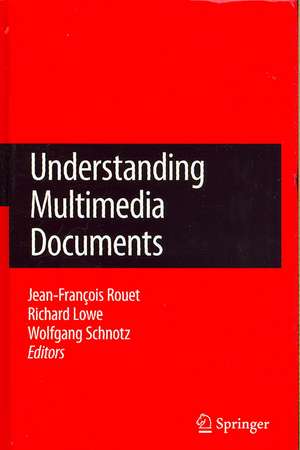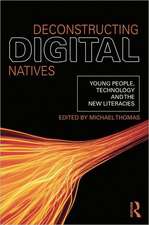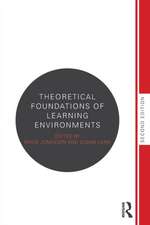Understanding Multimedia Documents
Richard Lowe Editat de Jean-Francois Rouet Wolfgang Schnotzen Limba Engleză Hardback – 28 iul 2008
| Toate formatele și edițiile | Preț | Express |
|---|---|---|
| Paperback (1) | 890.37 lei 6-8 săpt. | |
| Springer Us – 4 noi 2010 | 890.37 lei 6-8 săpt. | |
| Hardback (1) | 647.08 lei 6-8 săpt. | |
| Springer Us – 28 iul 2008 | 647.08 lei 6-8 săpt. |
Preț: 647.08 lei
Preț vechi: 761.27 lei
-15% Nou
Puncte Express: 971
Preț estimativ în valută:
123.82€ • 129.62$ • 102.45£
123.82€ • 129.62$ • 102.45£
Carte tipărită la comandă
Livrare economică 05-19 aprilie
Preluare comenzi: 021 569.72.76
Specificații
ISBN-13: 9780387733364
ISBN-10: 0387733361
Pagini: 290
Ilustrații: XII, 290 p.
Dimensiuni: 155 x 235 x 18 mm
Greutate: 0.6 kg
Ediția:2008
Editura: Springer Us
Colecția Springer
Locul publicării:New York, NY, United States
ISBN-10: 0387733361
Pagini: 290
Ilustrații: XII, 290 p.
Dimensiuni: 155 x 235 x 18 mm
Greutate: 0.6 kg
Ediția:2008
Editura: Springer Us
Colecția Springer
Locul publicării:New York, NY, United States
Public țintă
ResearchCuprins
Understanding Multimedia Documents: An Introduction.- Understanding Multimedia Documents: An Introduction.- Memory Processes in Multimedia Comprehension.- Why Multimedia Learning is not Always Helpful.- Text and Picture Integration in Comprehending and Memorizing Spatial Descriptions.- Display of Key Pictures from Animation: Effects on Learning.- Levels of Verbal Redundancy, Note-Taking and Multimedia Learning.- Learning from a Multimedia Explanation: A Comparison of Static Pictures and Animation.- Contextual Strategies in Document-Based Learning.- Search and Comprehension Processes in Learning from Text.- Searching User-Controllable Animations During Learning.- Studying Eye Movements in Multimedia Learning.- The Interaction of Verbal and Pictorial Information in Comprehension and Memory.- Multimedia Research in Perspective.- Hypertext Was Born Around 1200.- From Film and Television to Multimedia Cognitive Effects.- How Should We Evaluate Multimedia Learning Environments?.- Memory Processes in Text and Multimedia Comprehension: Some Reflections and Perspectives.
Textul de pe ultima copertă
Understanding Multimedia Documents deals with issues of great interest to an expanding community of multimedia designers and professional users, such as teachers and information workers. Multimedia documents are increasingly used to communicate knowledge in the mass media and educational contexts. In order to improve their practice, designers, teachers, and other professionals interested in the use of multimedia documents must be aware of how multimedia documents impact students' perception, comprehension and use of information.
Yet knowledge of multimedia quality and its optimal conditions of use is still rather fragmented. While there have been significant advances in the theoretical and empirical analysis of individual processes of document comprehension, the field is still evolving rapidly. New and sophisticated investigation techniques have been designed in the past few years, e.g., eye tracking, automated data collection, that provide analytical data on the complex mental processes involved. The studies presented in this book reflect those advances. They cover a wide range of situations, tasks and domains where multimedia documents may be used and provide in-depth information about the cognitive processes involved in the comprehension and use of such documents.
Understanding Multimedia Documents is of interest to researchers and professionals in a variety of fields, including education and multimedia information systems.
Yet knowledge of multimedia quality and its optimal conditions of use is still rather fragmented. While there have been significant advances in the theoretical and empirical analysis of individual processes of document comprehension, the field is still evolving rapidly. New and sophisticated investigation techniques have been designed in the past few years, e.g., eye tracking, automated data collection, that provide analytical data on the complex mental processes involved. The studies presented in this book reflect those advances. They cover a wide range of situations, tasks and domains where multimedia documents may be used and provide in-depth information about the cognitive processes involved in the comprehension and use of such documents.
Understanding Multimedia Documents is of interest to researchers and professionals in a variety of fields, including education and multimedia information systems.
Caracteristici
Clear focus on multimedia documents considered from a cognitive perspective Includes new ideas about how readers deal with multimedia information Presents new empirical findings about what works and what does not work in the design and use of multimedia documents Offers both a scientific and a historical perspective on the design and use of documents Includes new examples of documents illustrating positive and negative design options














